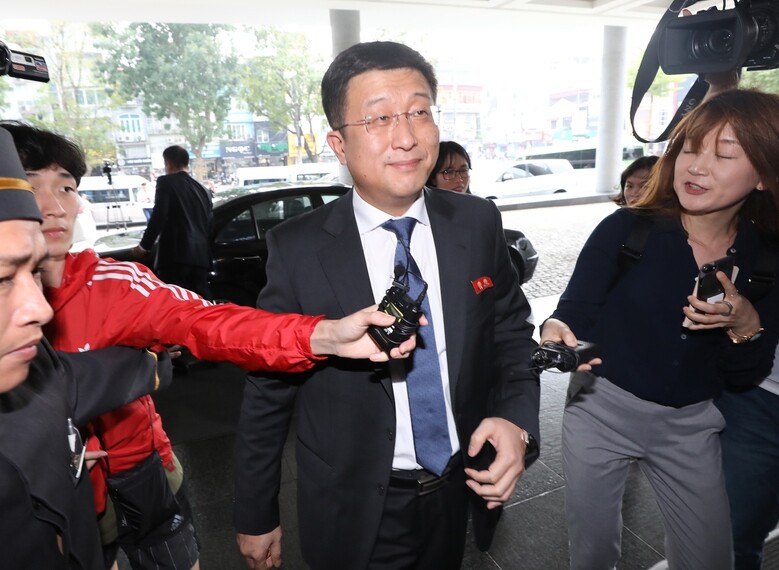hankyoreh
Links to other country sites 다른 나라 사이트 링크
[Editorial] US needs to be more proactive and flexible in approach to sanctions relief

On Feb. 21, the US government held a conference call with the press to explain its position in regard to a number of disputes related to the North Korea-US summit. During that call, a senior official in the US government spoke of the need for movements that are “very fast” and “very big” and called on the North to take action. The White House also released a separate statement in which it listed incentives, asserting that it’s prepared to bring investment into North Korea if it follows through on its commitment to complete denuclearization. With the second North Korea-US summit right around the corner, the US appears to be approaching the North with a combination of pressure and placation.
The US official responded to remarks about simultaneous and parallel action that US State Department Special Representative for North Korea Stephen Biegun made during a recent speech at Stanford University by saying that Biegun hadn’t said anything about a “step-by-step” approach. The US doesn’t regard gradual measures to be the main driver of this process, the official went on to say, suggesting that the US prefers a swift, all-inclusive deal to a step-by-step solution. The official also mentioned a freeze on all weapons of mass destruction and missile programs as a priority of this summit.
The fact that this official mentioned a freeze rather than dismantlement or destruction may prompt the inference that the US has given up its pursuit of complete denuclearization. But given the White House’s reconfirmation of complete denuclearization and its reminder of North Korea’s promise to dismantle its plutonium and uranium enrichment facilities, it would be more appropriate to assume that the US intends for the freeze to be the initial step toward denuclearization.
The US government apparently made a point of approaching the press in this manner because it’s determined to get some tangible results out of this summit. But since negotiations are a two-way street, determination alone is not sufficient. Unless the US offers adequate compensation for North Korea’s denuclearization, there’s no guarantee that major progress will occur. The White House did offer a vague incentive about exploring ways to encourage investment in the North by US partners, improve infrastructure, promote food security and more, but it needs to have the flexibility to offer a more proactive and specific plan for easing sanctions on the North.
A few days ago, South Korean President Moon Jae-in told US President Donald Trump that he’s prepared to take responsibility for inter-Korean road and railway connections and inter-Korean economic cooperation projects if Trump makes the request. If the US is unable to move directly because of its political situation at home, it’s time to actively consider taking advantage of Moon’s proposal.
Please direct comments or questions to [english@hani.co.kr]

Editorial・opinion
![[Editorial] Penalties for airing allegations against Korea’s first lady endanger free press [Editorial] Penalties for airing allegations against Korea’s first lady endanger free press](https://flexible.img.hani.co.kr/flexible/normal/500/300/imgdb/original/2024/0502/1817146398095106.jpg) [Editorial] Penalties for airing allegations against Korea’s first lady endanger free press
[Editorial] Penalties for airing allegations against Korea’s first lady endanger free press![[Editorial] Yoon must halt procurement of SM-3 interceptor missiles [Editorial] Yoon must halt procurement of SM-3 interceptor missiles](https://flexible.img.hani.co.kr/flexible/normal/500/300/imgdb/child/2024/0501/17145495551605_1717145495195344.jpg) [Editorial] Yoon must halt procurement of SM-3 interceptor missiles
[Editorial] Yoon must halt procurement of SM-3 interceptor missiles- [Guest essay] Maybe Korea’s rapid population decline is an opportunity, not a crisis
- [Column] Can Yoon steer diplomacy with Russia, China back on track?
- [Column] Season 2 of special prosecutor probe may be coming to Korea soon
- [Column] Park Geun-hye déjà vu in Yoon Suk-yeol
- [Editorial] New weight of N. Korea’s nuclear threats makes dialogue all the more urgent
- [Guest essay] The real reason Korea’s new right wants to dub Rhee a founding father
- [Column] ‘Choson’: Is it time we start referring to N. Korea in its own terms?
- [Editorial] Japan’s rewriting of history with Korea has gone too far
Most viewed articles
- 160% of young Koreans see no need to have kids after marriage
- 2Months and months of overdue wages are pushing migrant workers in Korea into debt
- 3[Editorial] Penalties for airing allegations against Korea’s first lady endanger free press
- 4[Guest essay] Maybe Korea’s rapid population decline is an opportunity, not a crisis
- 51 in 3 S. Korean security experts support nuclear armament, CSIS finds
- 6[Reporter’s notebook] In Min’s world, she’s the artist — and NewJeans is her art
- 7Bills for Itaewon crush inquiry, special counsel probe into Marine’s death pass National Assembly
- 8S. Korea discusses participation in defense development with AUKUS alliance
- 9Japan’s standards for use of preemptive counterstrike against N. Korea remain unclear
- 10Trump asks why US would defend Korea, hints at hiking Seoul’s defense cost burden